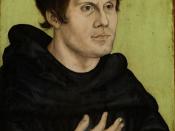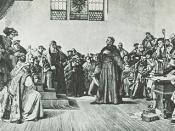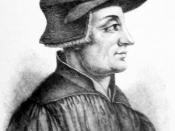Read Kung 524-604. Define Paradigm IV and contrast it with the Roman Catholic Paradigm that preceded it. Contrast the outlook of Luther, Zwingli, and Calvin. What criticisms does Kung bring against the Reformation? Does the Anglican Reformation solve these problems? Write four pages.
The Reformation Paradigm completely changed the face of the Roman Catholic Paradigm that preceded it, as well as the structure of the church itself. It entailed a return of the church to the gospel of Jesus Christ as presented in the Bible and the writings of Paul. This shift took shape in three primary areas- matters of church authority, mediation of man with God, and salvation. Ultimately, it culminated in a criticism of the Roman Catholic Church, evoking a violent response. The figure at the head of this movement was Martin Luther, with Huldrych Zwingli and Jean Calvin as later counterparts who differed slightly in their views, yet still affected change for the Christian church in their own and coming generations.
Kung criticizes the Reformation for not accomplishing its true goal, which was to completely divorce church from state. In all actuality, the later Anglican Reformation did not accomplish this either.
The Protestant Reformation affected three major areas- matters of church authority, mediation of man with God, and salvation. In authoritative matters, traditional laws and authorities were once predominant in the Catholic Church- councils and canonical rulings. With the Protestant Reformation, however, a new notion was introduced [by Luther.] This was the idea of sola scriptura, or the primacy of scripture alone, as the basis for final rulings. In the role of mediator between God and man was solus Christus, Christ alone, as opposed to the myriad of saints that had taken the role of go-betweens for the Roman Catholic Church. In regards to salvation, sola...


